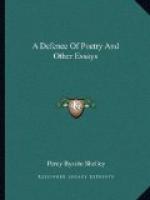The relations of these remain unchanged; and such is the material of our knowledge. What is the cause of life? that is, how was it produced, or what agencies distinct from life have acted or act upon life? All recorded generations of mankind have weariedly busied themselves in inventing answers to this question; and the result has been,—Religion. Yet, that the basis of all things cannot be, as the popular philosophy alleges, mind, is sufficiently evident. Mind, as far as we have any experience of its properties, and beyond that experience how vain is argument! cannot create, it can only perceive. It is said also to be the cause. But cause is only a word expressing a certain state of the human mind with regard to the manner in which two thoughts are apprehended to be related to each other. If any one desires to know how unsatisfactorily the popular philosophy employs itself upon this great question, they need only impartially reflect upon the manner in which thoughts develop themselves in their minds. It is infinitely improbable that the cause of mind, that is, of existence, is similar to mind.
[1815; publ. 1840]
ON A FUTURE STATE
It has been the persuasion of an immense majority of human beings in all ages and nations that we continue to live after death,—that apparent termination of all the functions of sensitive and intellectual existence. Nor has mankind been contented with supposing that species of existence which some philosophers have asserted; namely, the resolution of the component parts of the mechanism of a living being into its elements, and the impossibility of the minutest particle of these sustaining the smallest diminution. They have clung to the idea that sensibility and thought, which they have distinguished from the objects of it, under the several names of spirit and matter, is, in its own nature, less susceptible of division and decay, and that, when the body is resolved into its elements, the principle which animated it will remain perpetual and unchanged. Some philosophers-and those to whom we are indebted for the most stupendous discoveries in physical science, suppose, on the other hand, that intelligence is the mere result of certain combinations among the particles of its objects; and those among them who believe that we live after death, recur to the interposition of a supernatural power, which shall overcome the tendency inherent in all material combinations, to dissipate and be absorbed into other forms.
Let us trace the reasonings which in one and the other have conducted to these two opinions, and endeavour to discover what we ought to think on a question of such momentous interest. Let us analyse the ideas and feelings which constitute the contending beliefs, and watchfully establish a discrimination between words and thoughts. Let us bring the question to the test of experience and fact; and ask ourselves, considering our nature in its entire extent, what light we derive from a sustained and comprehensive view of its component parts, which may enable, us to assert, with certainty, that we do or do not live after death.




